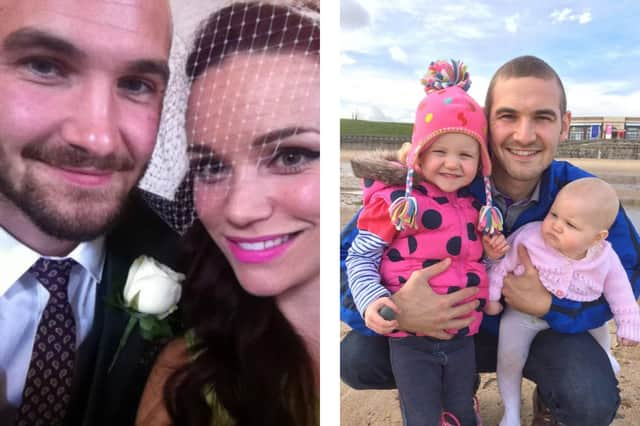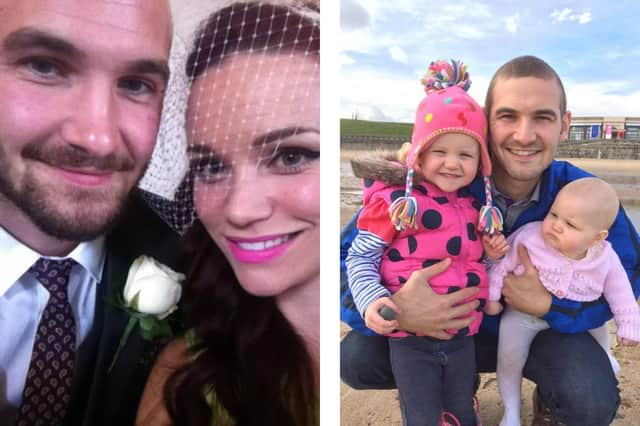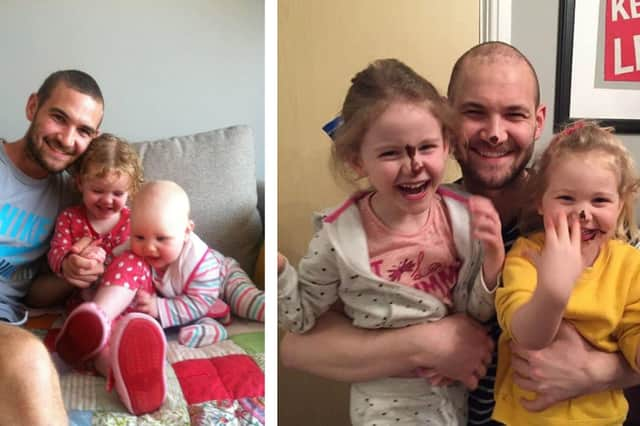Waterloo Road actor Holly Matthews fundraises for hospice after tragic death of husband, 32, to brain cancer


A former Waterloo Road and Byker Grove actor is working to support the hospice that cared for her dying husband. Holly Matthews, 39, has dedicated herself to helping Myton Hospice in Warwickshire as a way of saying thanks for all they did for her husband Ross Blair.
Ross was diagnosed with a brain tumour in 2014 and died aged 32 three years later in July 2017. Now Holly, who has two daughters - Blair and Texas - with Ross, and is now a personal development coach, wants to highlight how hospices need cash to survive.
Advertisement
Hide AdAdvertisement
Hide AdRoss was diagnosed with brain cancer when he was 29, which means “parts of him were going already”, said Holly. Their daughters were just one and four years old at the time.
Holly said: “He was essentially brain damaged because of the tumours in his brain, which meant that his behaviour was erratic, which would mean I couldn't settle and I couldn't rest. When I was at home, I was constantly in a state of panic and fight or flight. I was worrying about what was going to happen next.
“When it's 11 o'clock at night and you've got a baby crying and a little one coming out to cry. You've got your husband who's wetting himself. You're trying to do all of that on your own. That's just so traumatic and so difficult.
“I'm 5ft 1in and about 7.5 stone, so for me, physically moving Ross, who was a 6ft man, was such a strain. I was so scared that I was going to hurt him or he was going to hurt me because essentially you've got somebody who is brain damaged. I was a mum who had two young kids and whose husband was dying. It was really, really challenging.”
Advertisement
Hide AdAdvertisement
Hide AdMr Blair went to Myton Hospice in 2017 for a month after realising he was “at the end of life stage.” Holly said the hospice provided her “space to breathe” in surroundings that “weren't horrible” and didn't make her feel “anxious”. She said: “It allowed us to be a family without having to do the role of a carer or nurse… If I needed to leave the room, I wasn't worrying that he wasn't being taken care of.”
Holly spent Ross’s last month with him. She said: “The staff pulled in a twin bed, and pulled me up next to Ross. I was able to be there the whole time, which was really important. I really needed to be there when Ross died and it was important to me to see him through that.”


“When I was waking at night, the nurses would sit with me and get me hot chocolate. They would talk to me and answer the questions that I'd been googling because I didn't have the answers. It was really, really helpful. There was never a feeling that you were bothering anybody.”
Their daughters, who were then four and six years old, could go into a family room with toys and stay overnight on one of the nights, which made them “feel connected.” Mrs Mathews said: “Because I wasn't with (our daughters) either, I wasn't home and Ross wasn't home, having that service was really, really special.”
Advertisement
Hide AdAdvertisement
Hide AdShe added that Myton Hospice’s care meant that the girls “still have memories of that as something positive and not a negative experience”. “When they were going through their dad dying, that's such a traumatic experience but the hospice brought in something light and something joyful,” she added.
Holly remembers sitting with a nurse who told her in the morning that her husband was going to die. “I think sitting with that nurse and her listening to what I was saying and what I was experiencing and her validating that experience also gave me some advice and calmness that made me feel less fearful about the whole experience.”
She said she was “heartened” because many of the nurses from the hospice were crying and upset for them when her husband died. They even came to the funeral. “I think they were really special people to work in a hospice and to handle the family through the most difficult experience of their lives,” she said.
Holly first raised funds for Myton Hospice in 2017, and is fundraising again. She also mentioned her two daughters would like to find something age-appropriate to support the hospice. She has now raised more than £11,000 overall, including £2,500 by abseiling down the 90ft-tall Coventry Cathedral last month, which makes her the top sponsor. She said she has realised the hospice is underfunding due to the effect of the cost-of-living crisis and Covid-19.
Advertisement
Hide AdAdvertisement
Hide AdLaura Dadson, a communications assistant at Myton Hospice, said the hospice is facing huge challenges, and one-third of adults in Coventry and Warwickshire with palliative care needs don’t receive the care or pain relief they need.


“Just 20% of our funding comes from the NHS. We rely on donations and support from our local communities. We have to raise £10.5m of the £13.25m we need this year to continue providing our services free of charge,” she added.
According to the survey from Hospice UK, 70% of hospices stated that because of the significant cost of living, they are highly likely to reduce support they can offer.
Advertisement
Hide AdAdvertisement
Hide AdOlivia Warnes, senior policy and public affairs officer at Hospice UK, said: “Fundraising is incredibly important to hospices. Most of the money that allows hospices to deliver their services comes from community fundraising. Keeping up with cost pressures is the number one challenge that hospices across the UK are facing right now.
“Many hospices are forecasting a deficit budget for the next financial year. Hospices are under a huge amount of pressure right now. We need to get to a place where hospice funding is more sustainable, so hospices don't reduce their services or limit the vital care they offer to patients and families."
Comment Guidelines
National World encourages reader discussion on our stories. User feedback, insights and back-and-forth exchanges add a rich layer of context to reporting. Please review our Community Guidelines before commenting.